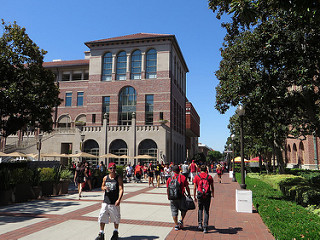Abusing your privilege doesn’t pay off

The Ronald Tutor Campus at the University of Southern California. A handful of Mason students were rejected from USC and are upset about the college scandal. (Photo Courtesy of Ken Lund via Flicker).
March 28, 2019
There are students across the country that wake up early in the morning to go to that extra morning class, go to work after school, are active members of school clubs, earn exceptional grades, come home late at night from a sport to a pile of homework for the next day, all trusting that, with hard work and persistence, they will be rewarded with admission to a good college. However, the recent college admissions scandal involving wealthy parents cheating, bribing, and paying their children’s way into top colleges and universities, such as the University of Southern California and Yale, has sparked a discussion among students about public morals, the entitlement of the wealthy, and the loss of trust in college admissions.
Solid grades and a high GPA are not enough to earn a spot at these top tier schools. Being an active member of school clubs and having volunteer hours are pretty much required. These colleges have to be able to differentiate between these students and assess how unique each student is in order to pick the best for these limited spots. This commitment from both the students and parents does not come inexpensively. Parents take their kids back and forth from school activities, invest in their kids with classes, tutoring, sports, all with the idea that this will lead them to be successful in the future.
As an IB Diploma striving students, this news is infuriating. Every school day, I wake up at 5:30 am to go to TOK class, have an 8-hour school-day full of stressful and information-packed classes, come home to work on homework for more than four hours, go crazy and stress to achieve a high score on my SAT, and repeating the cycle until Friday.
In addition, I have friends that also take multiple IB classes and are student-athletes that work their hardest to earn good grades, score goals at their games, suffer through injuries, and earn high SAT/ACT test scores. The idea that students were photoshopped in pictures to be seen as student-athletes to gain admissions to college without having suffered through the grueling practices and made significant sacrifices, make many of us question whether we can trust college admissions.
“I felt like a victim of the system and as though I had been scammed. I was angry at the fact that my chances of getting into a ‘prestigious’ university through hard work could be crushed because a family with money could just pay for their kid to get in… If anything, I think this college fraud finally being brought to national and international attention will encourage colleges to become more vigilant in reviewing applications,” said senior Sophie Pittaluga.
Certainly, elite schools are already populated by plenty of kids whose parents, if they didn’t actually buy their children’s way in, certainly bribed the admissions process with something. If your grandfather built a library at Yale, you may not need to score as high on the SAT as the student who sits next to you who studies till midnight every night after coming home from the after-school job in order to help his parents save up for college.
If you have the money to bribe your way into college, you already have so many advantages it’s almost impossible to quantify. However, there is a difference between using money to enhance your skills by accessing tutors or test prep programs and bribing your way into college. There is nothing wrong with using the available tools to get accepted into a top tier college, but nothing should be handed out without merit.
Even if some families such as the ones in Falls Church could afford to pay their way to college, many of them do not choose that route as they are morally driven to work for their college admission or the money in the family is not enough to divide it among all the children in the household.
The danger of these practices is that students who put in the work were denied admission at universities because wealthy parents found a way to game the system. Diligence should always be rewarded, but unfortunately, money often speaks the loudest. That’s the biggest tragedy in all of this. How many deserving students lost out on the chance to attend a school to a student whose admission was purchased?
I understand the fact that parents want what is best for their child, but this is extreme. It is a pity that, at the same time, these parents did not believe their children were smart enough or dedicated enough to be able to gain admission by the proper measures.
Even worse, by handing their children something that they didn’t earn, they definitely aren’t doing what’s best for their children. They’re neglecting them the opportunity to work for their own success. Mom and Dad aren’t going to be able to buy you everything in life. Kids need to learn that if they want something, they need to work for it and then when they do get it, it’s that much better.








